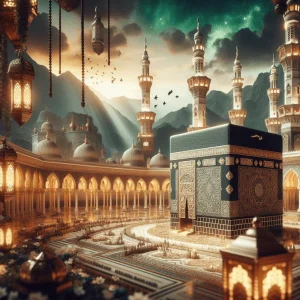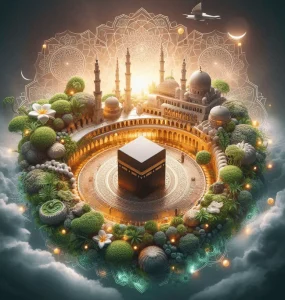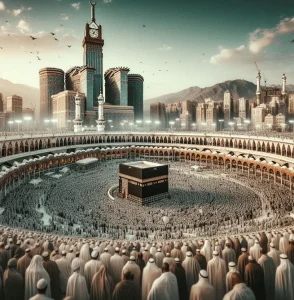Table of Contents
Embark on a transformative journey with the Hajj pilgrimage. Discover the rituals, history, and significance of this sacred Islamic pilgrimage. Explore the Five Pillars of Islam, prepare for the spiritual calling, and learn about the profound rituals that define Hajj.

The Hajj pilgrimage, often referred to as simply “Hajj,” stands as one of the most profound and sacred journeys in the Islamic faith. This comprehensive guide aims to unravel the intricacies of this spiritual expedition, offering insights, advice, and answers to the numerous questions that arise when embarking on this transformative voyage.
Hajj is not just a religious obligation; it is a life-altering opportunity for millions of Muslims around the world to strengthen their faith, seek forgiveness for their sins, and connect with their spiritual essence. Rooted in the annals of history and enshrined as one of the Five Pillars of Islam, the Hajj pilgrimage carries a legacy that dates back to the time of the Prophet Ibrahim and his son Isma’il.
In the heart of the holy city of Mecca, the Kaaba, a simple yet profoundly significant structure, serves as the focal point of the Hajj pilgrimage. It is here that the faithful come to circumambulate, to stand in prayer, and to seek a deeper connection with the divine.
This journey, however, is not just about rituals; it’s about spiritual awakening, renewal, and a sense of unity with the global Muslim community. It’s about answering the call of faith, embarking on a life-changing expedition, and returning home spiritually rejuvenated.
In the pages that follow, we will delve deep into the roots and significance of the Hajj pilgrimage, the meticulous preparations required for this journey, and the sacred rituals that define it. We will explore the emotional and spiritual impact it leaves on pilgrims and the way it binds the Muslim community together.
So, whether you are a prospective pilgrim seeking guidance or a curious soul eager to understand the Hajj pilgrimage better, this guide will illuminate the path, making your journey more meaningful and informed. Let’s begin our exploration of the Hajj pilgrimage, a journey of faith, devotion, and self-discovery.
Understanding Hajj Pilgrimage
The Hajj pilgrimage, an Islamic ritual that transcends borders and cultures, holds profound significance in the lives of Muslims worldwide. To embark on this spiritual odyssey is to partake in a tradition that spans millennia and connects generations of faithful believers. In this section, we will delve deeper into the roots and significance of the Hajj pilgrimage, shedding light on its historical origins, its role as one of the Five Pillars of Islam, and its unique blend of obligation and opportunity.
The Roots of Hajj
The historical roots of the Hajj pilgrimage can be traced back to the legendary Prophet Ibrahim (Abraham in Judeo-Christian tradition) and his son Isma’il (Ishmael). It is believed that they were called upon by Allah (God) to construct the Kaaba, the sacred cubic structure located in the heart of Mecca. This celestial directive laid the foundation for the Hajj pilgrimage, as Muslims today retrace the footsteps of these noble forefathers.
The Kaaba itself has a rich history. It is not merely a building of stone and mortar; it is a symbol of unity, devotion, and submission to the divine will. Every corner of the globe is oriented toward the Kaaba, highlighting its significance as the spiritual compass for Muslims.
Five Pillars of Islam
The Hajj pilgrimage finds its place among the Five Pillars of Islam, a set of fundamental acts of worship and practice that serve as the bedrock of the Islamic faith. These pillars include the declaration of faith (Shahada), prayer (Salat), almsgiving (Zakat), fasting during Ramadan (Sawm), and, of course, the pilgrimage to Mecca (Hajj).
Each of these pillars represents a key facet of a devout Muslim’s life. While they all hold their unique importance, the Hajj pilgrimage is exceptional in its transformational power. It’s not merely a ritual to be performed; it’s an experience that leaves an indelible mark on the soul.
Hajj: Obligation and Opportunity
One of the most striking aspects of the Hajj pilgrimage is its dual nature. On one hand, it is a religious obligation, a commandment from Allah. Every Muslim who is mentally and financially capable is obligated to undertake the Hajj at least once in their lifetime. It is a duty that transcends socioeconomic status, nationality, and ethnicity, emphasizing the equalizing force of faith.
On the other hand, the Hajj is a remarkable opportunity—a journey that is often considered the pinnacle of a Muslim’s spiritual life. It offers a chance to seek forgiveness, to shed the burdens of the past, and to emerge spiritually purified. It is a time for deep introspection, reflection, and connection with the divine.
For many, the decision to embark on the Hajj pilgrimage is not taken lightly. It is a momentous step, a call to transcend the material world and immerse oneself in the spiritual realm. It is a journey of faith, devotion, and surrender.
As we continue this exploration of the Hajj pilgrimage, we will navigate the preparations necessary to answer this divine call and the sacred rituals that unfold in the holy city of Mecca. In the pages that follow, we will guide you through the practical aspects of this journey while unraveling its profound spiritual dimensions. Prepare to embark on a path of enlightenment, as we delve into the heart of the Hajj pilgrimage.
Preparing for the Journey
Preparing for the Hajj pilgrimage is a multifaceted process that encompasses not only logistical arrangements but also deep spiritual readiness. The journey to Mecca is a once-in-a-lifetime experience for many, and careful planning is crucial to ensure that the pilgrimage proceeds smoothly and fulfills its profound spiritual purpose. In this section, we will explore the spiritual calling that compels individuals to undertake Hajj, the financial and physical preparations required, and the importance of making meticulous travel arrangements.
The Call to Hajj
The decision to embark on the Hajj pilgrimage often stems from a deeply rooted spiritual calling. For many Muslims, it is a lifelong aspiration, a dream nurtured from childhood. This calling transcends the ordinary and ignites a profound desire to draw nearer to Allah. It is a recognition of the temporal nature of life on Earth and a longing for spiritual elevation.
The call to Hajj is not merely a whim or a desire for adventure; it is a compelling urge that emanates from the depths of the soul. It is a recognition of the obligation placed upon every eligible Muslim and a yearning for the immense spiritual rewards promised to those who undertake this sacred journey.
Financial and Physical Preparation
Undertaking the Hajj pilgrimage requires meticulous financial and physical preparation. Financially, pilgrims must ensure that they have the means to cover the expenses associated with the journey, including travel, accommodation, and other essential costs. This often necessitates careful budgeting and saving over a considerable period.
Physically, pilgrims must be in good health and capable of enduring the rigors of the pilgrimage. Hajj involves significant physical exertion, including long walks, exposure to the elements, and standing in prayer for extended periods. Pilgrims are advised to engage in regular physical exercise and consult with healthcare professionals to ensure their well-being during the pilgrimage.
Travel Arrangements
Traveling to Mecca for Hajj requires thorough planning and arrangement. Pilgrims need to secure transportation to Saudi Arabia, book accommodations in Mecca, and organize transportation within the city for the various rituals. It is advisable to make these arrangements well in advance, as the influx of pilgrims during the Hajj season can lead to high demand for services.
In recent years, advancements in technology and communication have made it easier for pilgrims to access information and make reservations online. This has streamlined the process and enabled pilgrims to plan their journeys with greater ease and efficiency.
Spiritual Preparedness
While logistical preparations are essential, the spiritual dimension of Hajj is equally—if not more—important. Pilgrims are encouraged to engage in acts of worship, seek forgiveness for their sins, and strengthen their connection with Allah in the months leading up to the pilgrimage. Reading and understanding the rituals of Hajj is also crucial to ensure that the pilgrimage is performed correctly and with sincerity.
Ultimately, the preparations for the Hajj pilgrimage go beyond mere logistics. They involve a profound transformation of the soul, a deepening of faith, and a commitment to answering the divine call. As pilgrims embark on this sacred journey, they carry with them not only their physical belongings but also their hopes, prayers, and aspirations for spiritual growth and enlightenment.
In the following sections, we will guide you through the intricate rituals of the Hajj pilgrimage, where these preparations culminate in moments of profound significance. As you continue your exploration of this spiritual journey, may you find inspiration and guidance for your own pilgrimage, should you choose to undertake it.
Rituals of the Hajj Pilgrimage
The Hajj pilgrimage is a spiritual journey that encompasses a series of rituals, each carrying deep symbolic and religious significance. These rituals follow in the footsteps of the Prophet Ibrahim and his family, marking key events in their lives. The Hajj rituals are performed over several days, providing pilgrims with a profound opportunity for spiritual reflection, connection with Allah, and unity with fellow believers.
Ihram: The Sacred State
Before entering Mecca, pilgrims must don the white, seamless garment known as Ihram. This simple attire signifies purity and equality among all pilgrims. It also serves as a physical reminder of the sacred journey they are about to undertake.
The act of wearing the Ihram represents a mental and spiritual transition—a commitment to enter a state of devotion and surrender to Allah. During this time, pilgrims are required to refrain from certain activities, such as cutting their hair and nails, to symbolize their consecration to the pilgrimage.
Tawaf: Circumambulating the Kaaba
One of the most iconic and sacred rituals of the Hajj pilgrimage is Tawaf. Pilgrims circumambulate the Kaaba seven times in a counterclockwise direction. The Kaaba, often referred to as the “House of Allah,” is at the heart of the Masjid al-Haram (the Grand Mosque) in Mecca.
The act of Tawaf signifies the unity and devotion of the Muslim community. As pilgrims circle the Kaaba, they express their commitment to Allah, their submission to His will, and their spiritual connection with millions of Muslims worldwide.
Arafat: The Day of Standing
On the ninth day of the Islamic month of Dhul-Hijjah, pilgrims gather at the plain of Arafat, a vast desert area located a few miles from Mecca. This day, known as the Day of Arafat, is considered the most crucial day of the Hajj pilgrimage.
Pilgrims stand in prayer and supplication, seeking forgiveness and spiritual elevation. It is believed that Allah descends His mercy upon the pilgrims during this time, and prayers made on the Day of Arafat are said to be answered. The atmosphere is one of intense devotion, as pilgrims reflect on their lives, seek repentance, and offer prayers for themselves and their loved ones.
Stoning the Devil
The ritual of ‘Ramy al-Jamarat’ involves the symbolic stoning of the devil. Pilgrims gather at three pillars in Mina, representing the locations where Satan attempted to dissuade Prophet Ibrahim from following Allah’s command.
As they throw pebbles at these pillars, pilgrims reaffirm their rejection of Satan’s temptations and their commitment to resisting evil in their lives. It is a powerful symbol of faith and an act of defiance against the forces of darkness.
Sacrifice and Eid al-Adha
One of the final acts of the Hajj pilgrimage is the Qurbani, the sacrifice of an animal, typically a lamb or goat. This act symbolizes the willingness to submit to Allah’s will, just as Prophet Ibrahim was prepared to sacrifice his son Isma’il as an act of obedience.
The meat from the sacrifice is distributed among the needy, emphasizing the importance of charity and sharing with the less fortunate. The Qurbani also coincides with the celebration of Eid al-Adha, the Festival of Sacrifice, which marks the conclusion of Hajj.
These rituals of the Hajj pilgrimage not only hold deep religious significance but also foster a profound sense of unity among the pilgrims. As they perform these acts, they are reminded of their commitment to faith, their connection to the Prophet Ibrahim’s legacy, and their place in the global Muslim community. These rituals serve as a powerful vehicle for spiritual growth and transformation, making the Hajj pilgrimage an experience like no other.
After the Hajj
Completing the Hajj pilgrimage is a momentous and deeply transformative experience that leaves an indelible mark on the hearts and souls of the pilgrims. The return from Mecca marks not the end of the journey, but rather the beginning of a new chapter in the pilgrim’s spiritual life. In this section, we will explore the emotional and spiritual impact of completing Hajj, the tradition of sharing one’s experiences with the community, and the lifelong journey of faith that follows.
Returning Home
As pilgrims depart from Mecca and make their way back to their home countries, they carry with them a sense of renewal, devotion, and spiritual growth. The physical journey may be over, but the impact of the Hajj pilgrimage continues to resonate within them.
The return home often brings mixed emotions—joy at having fulfilled a religious obligation, sadness at leaving the holy city of Mecca, and a profound sense of spiritual enrichment. Pilgrims are encouraged to reflect on their experiences and to carry the lessons learned during Hajj into their daily lives.
Sharing Experiences
One of the beautiful traditions that follow the Hajj pilgrimage is the sharing of experiences with the community. Muslims who have undertaken Hajj often share their stories, reflections, and insights with family, friends, and fellow community members. These narratives serve to strengthen the bonds of faith and inspire others to embark on the sacred journey.
Sharing experiences also allows pilgrims to convey the profound sense of unity and devotion that permeates the Hajj pilgrimage. It is a way of inviting others to partake in the spiritual journey and of spreading the message of faith, devotion, and submission to Allah.
Continuing the Journey
The Hajj pilgrimage is not a solitary event but rather a pivotal moment in a lifelong journey of faith. After returning from Mecca, pilgrims are encouraged to maintain the spiritual momentum gained during Hajj. This entails deepening one’s connection with Allah through acts of worship, charity, and seeking forgiveness.
Many pilgrims find that the Hajj experience strengthens their commitment to living a righteous and principled life. It instills a sense of humility, gratitude, and empathy for others. It also reinforces the importance of community and the bonds of brotherhood and sisterhood among Muslims.
Pilgrims are advised to continue their spiritual growth by engaging in regular acts of worship, reading and studying the Quran, and striving to embody the values and lessons learned during Hajj. The journey of faith, initiated by the Hajj pilgrimage, is an ongoing process of self-improvement and devotion.
In essence, the completion of the Hajj pilgrimage is not the end of a chapter but the beginning of a lifelong quest for spiritual excellence. It is a reminder that the path of faith is not confined to a single sacred journey but extends into every facet of one’s life. The lessons learned, the humility acquired, and the connection with Allah forged during Hajj serve as guiding lights on this enduring journey of faith.





More Stories
The Ultimate Guide to Securing Your Hajj Visa with Confidence and Ease
Unlock the Vital Importance of Mecca for Lasting Wellness and Inner Peace
The Glorious Truth: Exploring the Majestic Essence of the Kaaba Islam Definition